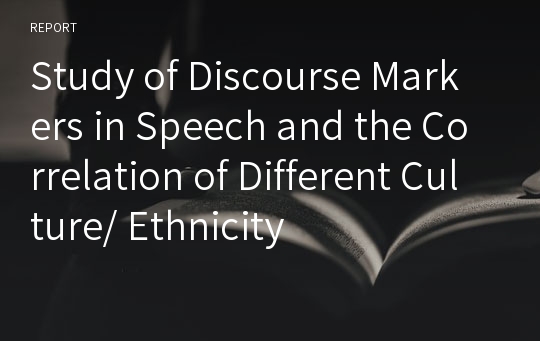Study of Discourse Markers in Speech and the Correlation of Different Culture/ Ethnicity
*지*
다운로드
장바구니
소개글
다양한 문화와 국적에 따른 영어의 담화표지 사용 연구목차
1. Introduction of Discourse Markers2. Background of DM
3. Theories & research method
4. data collection & results
5. Analysis & Discussion
6. Conclusion
본문내용
A funny video of African bro’ has been widely issued among Korean bloggers and YouTube channels lately. In the video, one black man is complaining about the service of McDonalds, and when the MR is added to his words, it becomes totally as if his rapping. African uses many Discourse Markers in their speech such as ‘yo’ ‘man’ ‘you ain’t’ ‘you know’ ‘I’mma’ or other slang words and inappropriate languages that creates the sense of rap music lyrics and special African-English tone. As many linguists today make their studies upon social values, Discourse Marker (DM) is also regarded as one significant part of sociolinguistics. The study of Discourse Marker demonstrates the function in a conversation with an integration of structural, semantic, pragmatic and several social factors like age, gender, social class and ethnicity. Despite the frequency or natural, unconditioned basis of using discourse markers in people’s daily conversation and other speeches, studies of DM relating to ethnicity are scarce. Therefore, this paper deals about the correlation between Discourse Markers and different nationalities world-wide, which is more compelling in the modern global society. The study aims not only to understand in what situations does people have higher tendency of using Discourse Markers, but also to discern the difference in the use of DM in different ethnicities and figure out the cause and effect by analyzing the results.참고 자료
Deborah Schiffrin. “Language in Society, Discourse markers”. Studies in Interactional Sociolinguistics, 5. Cambridge: Cambridge University Press, 1987. Volume 21. Issue 04. <http://journals.cambridge.org/action/displayAbstract?fromPage=online&aid=3000080>Fung L, Carter R. 2007.Discourse markers and spoken English: Native and learner use in pedagogic settings. Applied Linguistics, 28(3), and 410-30.
Knott A, Sanders T. 1998. The classification of coherence relations and their linguistic markers: an exploration of two languages. Journal of Pragmatics, 30, 135–17
Kyratzis, A. & Ervin-Tripp, S. (1999). The development of discourse markers in peer interaction. Journal of Pragmatics, 31, 1321-1338
Lee, S.W. “Adding MR to Black Bro Talk”. VVIP-Tistory.com. 23 Feb 2014. < http://eksldpf1.tistory.com/113>
Stubbe, Maria & Janet Holmes. (1995). “You know, eh” and other “exasperating expressions”: An analysis of social and stylistic variation in the use of pragmatic devices in a sample of New Zealand English. Language and Communication, 15, 63-88.
Vincent, Sophie, Sarah Darbaky, & Amina Mettouchi. (2009). The grammaticalization of you know: From shared knowledge to control over the co-speaker. English Text Construction, 2.2, 209-227.


























